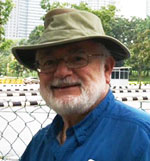By Oliver B. Pollak

RICHMOND, California — One Saturday in November in the 22-story five-star Sule Shangri La in Yangon, Myanmar, I breakfasted on an Indian egg dosa and my favorite Burmese confectionary, semolina. In the lobby I read the New York Times International edition. Page 4, was about the plight of the Rohingya on the Myanmar Bangladesh border 350 miles away across the Naf River.
We were upgraded to Horizon Club status because this was our fourth Shangri La visit, including Bangkok. It may be also because Burma’s hotels have a fifty percent occupancy rate. In my comfort a wave or dismay swept over me.
I have been a Burma watcher, from a distance, since 1970, when I wrote my doctoral dissertation at UCLA on Anglo-Burmese relations. I did not visit the country until October 2015. The military dictatorship, in place since 1962, had repositioned itself in 2010 from a commanding seat to ostensibly a side or back seat to democracy. Karen and I travelled from Rangoon to Mandalay on an Irrawaddy River boat, actually built in Vietnam. We could palpably see, feel and hear democracy, freedom of speech, and the country opening up. Several days after we left Aung San Suu Kyi was elected State Councilor. International sanctions were lifted.
Two years later sitting in a luxury hotel I wondered whether I was in 1939 Germany sitting comfortably in the Grand Hotel after Kristallnacht? As a child of Austrian and German refugee parents, part of my family died in concentration camps. In 2017 I was not a perpetrator, but does staying silent make you an enabler? Genocide, ethnic cleansing, mass graves, crimes against humanity coalesce and are mentioned almost daily, the plight of millions of displaced refugees more often than that.
What can I do? Leave the country early, voice a protest, risk arrest, detention, or deportation? Contact the U.S. or Israeli embassy? I was a tourist, a visitor, not a diplomat or an NGO human rights worker. Conscience struggled with comfort and fear. I bided my time, caught my taxi to the airport, and voiced my concerns from a safe place.
The tour bus guides say there is “no religious discrimination in our country.” Karen and I and our fellow travelers cringe awkwardly. We know better, we have been following human rights violations in Burma.
Yet if “our country” means the Irrawaddy valley, then Arakan renamed Rakhine is not part of “our country.” The Burmese surrendered this coastal region to the British in 1826 as spoils to the victor at the end of the First Anglo-Burmese War. But parsing history and semantics in the 21st century should leave no doubt, where the Rohingya live or lived is Burma, and the Burmese deny the citizenship of these Muslims, who date back as residents to at least the early 19th century; they are stateless people. The Burmese have a way of combining Buddhism and astrology to rename the country, move the capital, ban motorcycles, put their time zone in a half hour category, and do other contrarian things that suits their purpose and sense of difference. This includes devastating the Rohingya.
Aung San Suu Kyi was elected with great expectations. After all she received the Nobel Peace Prize in 1991. Hannah Beach, in recent New Yorker and New York Times articles dismantles our expectations. We saw what we wanted to see, a woman under decades of house arrest asserted her freedom of conscience. I visited the home of her father Aung San who was assassinated in 1947. There were photographs of The Lady as a two-year-old with her father.
The National League for Democracy won the November 2015 election and The Lady became 1st State Counsellor because special legislation directed at her prohibited a Burman with children born outside the country, from being Prime Minister, a contrivance based on a combination of guile, manipulation, and gerrymandering.
Aung San’s ineffectiveness, complicity, and virtual silence on the Rohingya has no exculpation. These non-Buddhist territorial outliers receive hardly lip service, and no real progress toward repatriation. The military appears to be enforcing a ‘Burma First’ policy.
Fascism and ethnic cleansing has not been good to my family. I am disappointed that two colonial countries I studied for over four decades, Burma/Myanmar and Rhodesia/Zimbabwe, where so much more was expected, have come to a sorry pass.
*
Pollak is a freelance writer based in Richmond, California.